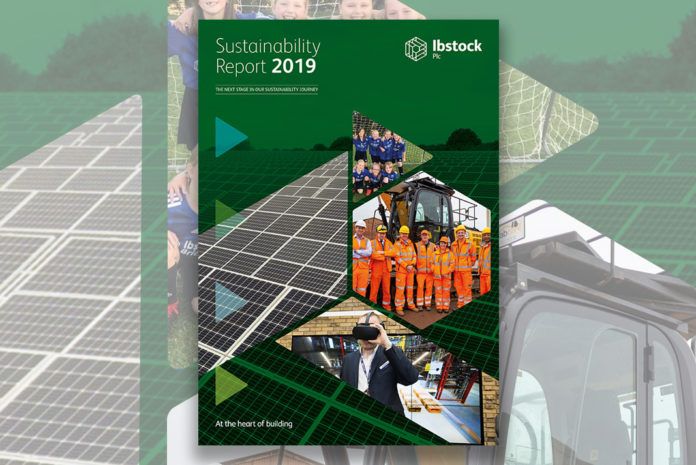Ibstock says its 2019 Sustainability Report, which has been published today (5 August), shows the progress it has made towards confirming its position as the most sustainable manufacturer of clay and concrete products in the UK.
This year’s report highlights progress made against the company’s Sustainability Roadmap 2025, which was launched in 2018 to lay down clear targets for the business under four core pillars: Customers and Suppliers, People, Environment and Communities.
Alongside positive news of progress made across all four sustainability areas, the report also includes four new commitments:
- Doubling of its target – to 20% – of sales turnover from new and sustainable products by 2025
- Commitment to select one factory to become a pilot net zero site
- Target of 40% reduction in preventable plastics by 2025
- Commitment to eliminate 200 tonnes of plastic shrink wrap in next 18 months (equivalent to 8.3 million soft drinks bottles).
Crucially, 2019 also marked the launch of the Ibstock Sustainability Board, chaired by non-executive director Claire Hawkings, and bolstered by external expertise from Isabel McAllister, who is responsible business director at international construction company Mace.
Environmental targets
During the reporting year, the Group achieved a 6.5% reduction in carbon emissions per tonne of production from the 2015 baseline. This figure is proof of the progress made towards achieving a minimum 15% reduction in CO2 emissions by 2025.
The Group also reports on a number of initiatives that are making a significant contribution to achieving its sustainability ambitions.
Within its concrete division, this includes successful lower carbon trials that will enable a reduction in the embodied carbon of its product range.
Within the clay division – which was been recognised for its exceptional environmental best practice in multiple high-profile awards during 2019 – the Eclipse factory, which has capacity for producing 100 million bricks a year, remains the most resource efficient brick manufacturing facility of its kind in Europe.
Several notable projects have been undertaken during the reporting year, including the completion of a solar park – the first of its kind in the brick industry – at the Group’s Leicestershire head office. This will supply 20-30% of the power requirement on-site. The company is also continuing to play its part in the reduction of reliance on fossil fuels through the installation of electric vehicle (EV) charging infrastructure at six sites.
Looking to the future, the Group has ambitious plans to achieve Net Zero Carbon. These projects, and others like them, are making an important step to push the business beyond its 2025 Roadmap and commit to long term sustainable investments.
Wider sustainability
From a wider sustainability perspective, Ibstock also reports on its successes in terms of training and development and local engagement.
The Group delivered over 11,000 training days in 2019 across a range of business functions; and 15 new apprentices joined the company’s programme – of which 100% were offered jobs on completion.
In terms of proactive engagement with local communities, Ibstock’s businesses hosted 13 open days and 39 educational visits in 2019, and supported 42 projects with product donations to local community causes.
Joe Hudson, chief executive officer of Ibstock, said: “2019 proved to be a year of strong progress for sustainability at Ibstock. Thanks to widescale engagement and hard work from our people, we have been able to make some significant steps towards our 2025 targets, as well as identifying opportunities where the business can go further to accelerate change.
“We are working very hard to be the most sustainable manufacturer of clay and concrete products in the UK and we are delighted at the progress so far. This is an ambition which is shared at all levels of the business and, of course, there is a groundswell of interest from outside our organisation too.
“There is no doubt that our customers, partners and wider stakeholders are demanding more and more from companies like ours when it comes to true sustainability, resource efficiency and supply chain transparency. As the built environment accounts for around 40% of the world’s carbon emissions, building product suppliers like us must show clear leadership and do all we can to drive change and reduce our impact on the natural world.”
To download the report, click here.




